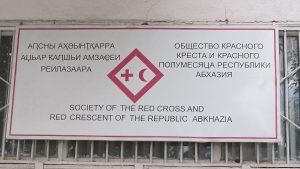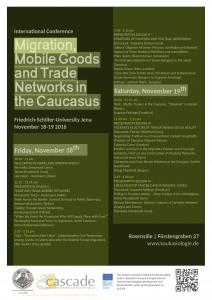
Jean Radvanyi, Professor at the National Institute of Oriental Languages and Civilisations, Paris, designer of the CASCADE Atlas
The CASCADE Atlas of the Caucasus, a regional and methodological challenge.
The Caucasus is difficult to describe with single and simple approaches. First of all, because of its diversity: it is not for nothing that it was called the “mountain of peoples”. The complexity of the administrative map, now divided into four states, themselves subdivided into eleven lower entities inherited from the Soviet regime, three of which are unrecognised secessionist regions, is matched only by its ethnic or religious complexity. Any study, irrespective of its methodology and discipline, historical, geographical, geopolitical, economic or social, encounters this complexity at the risk of abusive simplifications, however these are frequent in the literature and in the reports published by national or international organisations.
We are all looking for accessible tools, corpus of texts, chronologies, statistics and maps likely to help us to put some order or readability to this complexity. But can we rely on these instruments in a region plagued by tensions and conflicts, some of which are “frozen” and trigger contradictory historical narratives, a region where a significant part of the economy is considered as “gray” or “parallel”, and where refugees or displaced persons constitute a significant part of the population? By proposing to publish at the end of the CASCADE project a new Atlas of the Caucasus, we knew that the challenge was great. The simple gathering of official statistics in this fragmented area, whose methods of calculation are undoubtedly near to international standards but keep a lot of specificities, was the first challenge. Much of the data does present at the scale of the entire region. Others present biases such that their extrapolation raises more questions than answers for our analyses. But it is also by reflecting on the defects this statistical and spatial shadow game that one reveals the underlying stakes.
The set of maps that will be presented as one of the products of the CASCADE project is, as we are aware, uneven and perfectible. It will certainly be the subject of polemics, inevitable when one tries to unite in a single framework these four states that separate “frozen” conflicts, disputed territories, distinct economic and strategic trajectories. We hope, however, that they will make it possible to advance the understanding of the mutations which, at different rates, affect the whole region, beyond its new frontiers, some of which remain contested. They will all be available on a single site, CartOrient*, where they will fit into a larger body, including post-Soviet Central Asia and Iran. Thus conceived, we hope that this Cascade Atlas of the Caucasus will fulfill its original objective: to illustrate the complexity of this region and to offer, through cartographic representation, an additional tool for understanding and reflection. Read CASCADE Newsletter n.6
* The CartOrient project was initiated jointly by the UMR 7528 Mondes iranien et indien (CNRS, Sorbonne nouvelle – Paris 3, INALCO, EPHE) in collaboration with the EA 4513 Centre Europe Eurasie (INALCO). It is supported by the COMUE University Sorbonne Paris Cité (USPC).











